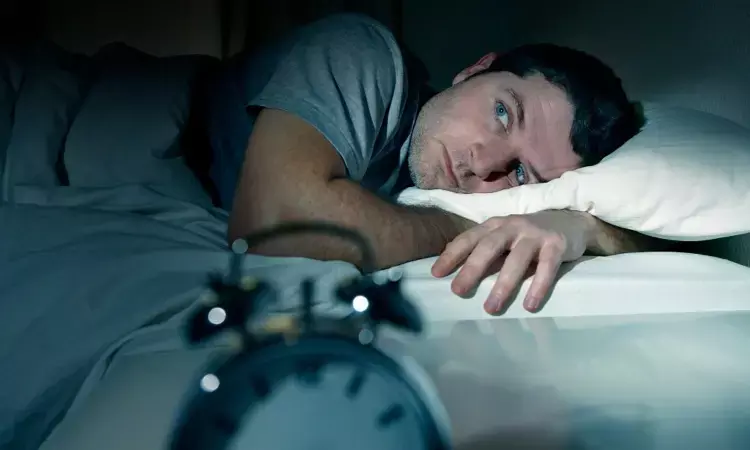- Home
- Medical news & Guidelines
- Anesthesiology
- Cardiology and CTVS
- Critical Care
- Dentistry
- Dermatology
- Diabetes and Endocrinology
- ENT
- Gastroenterology
- Medicine
- Nephrology
- Neurology
- Obstretics-Gynaecology
- Oncology
- Ophthalmology
- Orthopaedics
- Pediatrics-Neonatology
- Psychiatry
- Pulmonology
- Radiology
- Surgery
- Urology
- Laboratory Medicine
- Diet
- Nursing
- Paramedical
- Physiotherapy
- Health news
- Fact Check
- Bone Health Fact Check
- Brain Health Fact Check
- Cancer Related Fact Check
- Child Care Fact Check
- Dental and oral health fact check
- Diabetes and metabolic health fact check
- Diet and Nutrition Fact Check
- Eye and ENT Care Fact Check
- Fitness fact check
- Gut health fact check
- Heart health fact check
- Kidney health fact check
- Medical education fact check
- Men's health fact check
- Respiratory fact check
- Skin and hair care fact check
- Vaccine and Immunization fact check
- Women's health fact check
- AYUSH
- State News
- Andaman and Nicobar Islands
- Andhra Pradesh
- Arunachal Pradesh
- Assam
- Bihar
- Chandigarh
- Chattisgarh
- Dadra and Nagar Haveli
- Daman and Diu
- Delhi
- Goa
- Gujarat
- Haryana
- Himachal Pradesh
- Jammu & Kashmir
- Jharkhand
- Karnataka
- Kerala
- Ladakh
- Lakshadweep
- Madhya Pradesh
- Maharashtra
- Manipur
- Meghalaya
- Mizoram
- Nagaland
- Odisha
- Puducherry
- Punjab
- Rajasthan
- Sikkim
- Tamil Nadu
- Telangana
- Tripura
- Uttar Pradesh
- Uttrakhand
- West Bengal
- Medical Education
- Industry
Chronic pain, sleep quality and mental distress strongly related, suggests study

Chronic musculoskeletal pain, sleep quality, and mental distress are strongly linked, suggests a recent study published in the Journal of sleep research.
Musculoskeletal pain generally affects the bones, joints, ligaments, tendons, or muscles. It may be induced due to an injury like fractures, which may result in sudden and extreme pain. The musculoskeletal pain often interferes with the usual activities, like sleep.
Patients suffering from chronic pain often complain of insufficient sleep, and there are studies to bolster the evidence for a relationship between sleep disturbance and pain. However, data regarding their everyday associations is limited, particularly with data related to sleep measures such as actigraphy.
A study was conducted by Norwegian researchers, wherein they investigated 56 patients with chronic primary musculoskeletal pain. Their data was recorded in two separate 7-day data-collection periods; in the summer and winter, respectively.
Additionally, the impact of self-reported sleep quality, sleep duration as measured by actigraphy, efficiency and timing on next-day pain, as well as the effect of pain on the same sleep indices were approximated by generalized linear mixed regression models.
These models were also adjusted for age, sex, education, data collection period, weekend, season and mental distress, with the season and mental distress, additionally specified as moderators.
The findings of the study are as follows:
- The pain was strongly associated with disturbance in the next-night sleep (p = .003) as well as mildly associated with next-night sleep duration (p = .079).
- On the contrary, sleep quality provisionally estimated only the next-day pain (p = .063).
- There were no other day-to-day associations.
- Mental distress was the strongest estimator of pain, but it did not change the sleep–pain associations, nor did season.
The authors concluded that chronic pain, sleep quality, and poor mental health are linked closely, undermining the significance of confining this complexity in evaluation and treatment modalities of patients suffering from chronic pain.
Reference
A study titled, "Daily associations between sleep and pain in patients with chronic musculoskeletal pain" by Abeler K et. al published in the Journal of sleep research.
Dr. Shravani Dali has completed her BDS from Pravara institute of medical sciences, loni. Following which she extensively worked in the healthcare sector for 2+ years. She has been actively involved in writing blogs in field of health and wellness. Currently she is pursuing her Masters of public health-health administration from Tata institute of social sciences. She can be contacted at editorial@medicaldialogues.in.
Dr Kamal Kant Kohli-MBBS, DTCD- a chest specialist with more than 30 years of practice and a flair for writing clinical articles, Dr Kamal Kant Kohli joined Medical Dialogues as a Chief Editor of Medical News. Besides writing articles, as an editor, he proofreads and verifies all the medical content published on Medical Dialogues including those coming from journals, studies,medical conferences,guidelines etc. Email: drkohli@medicaldialogues.in. Contact no. 011-43720751


